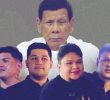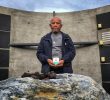
The National Federation of Labor Unions-Kilusang Mayo Uno (NAFLU-KMU, May First Movement) holds a tribute-dinner in honor of Felixberto Olalia, Sr. on April 16 in Quezon City, as part of activities in celebration of NAFLU-KMU�s turning 50 years old in May 2007. NAFLU-KMU�s founder Olalia Sr., a multi-awarded, highly popular labor leader in his time, a brave Huk guerrila commander and a timeless, shining example until now of what it means to champion genuine, militant and anti-imperialist unionism.
BY MARYA G. SALAMAT
Contributed to Bulatlat
Based on his own recollection, Felixberto Olalia, son of poor farmers from Pampanga, started working as an apprentice in a shoe factory at the age of 13. It�s a very young age for a boy to start working, but even before that, as a child, Olalia had actually worked for some time as a servant to a wealthy family in Tarlac, where he overheard his master saying that chili is bad for the poor because it increases their appetite and makes them eat more. That the poor have limited rights to having appetite and eating would be Olalia�s unforgettable first political lesson in life, a story he would narrate often.
Forced to stop schooling at a young age and brought to Manila�s miserable workers� district, Olalia came of age and started life not only as a young worker but also as a nationalist activist. He and his family first lived in Bagumbayan (Sta. Cruz) and Tondo. Given the concentration in the area and in the adjacent districts of strategic manufacturing and commercial establishments and workers� communities, these areas had historically been breeding grounds of the country�s first unions, union leaders and nationalist heroes.
The shoe shop where Olalia first worked had a union which, along with 21 other shoe shops belonged to the Union de Chineleros y Zapateros de Filipinas (UCZF, Union of Slipper Makers and Shoemakers of the Philippines). Perhaps because of his early experience at poverty, Olalia quickly joined the union�s activities. He became elected as �member� when the union reorganized, which meant Olalia became tasked to do lots of technical work, including functioning like a messenger. He recalled how he would hand the invites for a meeting to all 21 unions of UCZF. Olalia was elected as secretary from 1920 to 1925, then president up to 1940.
As member and later, a leader of UCZF, he and others led demonstrations demanding the Philippines� independence from the US and eight-hour working day (they worked twelve hours every day at the time). They brandished the Philippine flags during their rallies even if it was patently banned, and to be caught waving one meant a scuffle with the American police and imprisonment.










